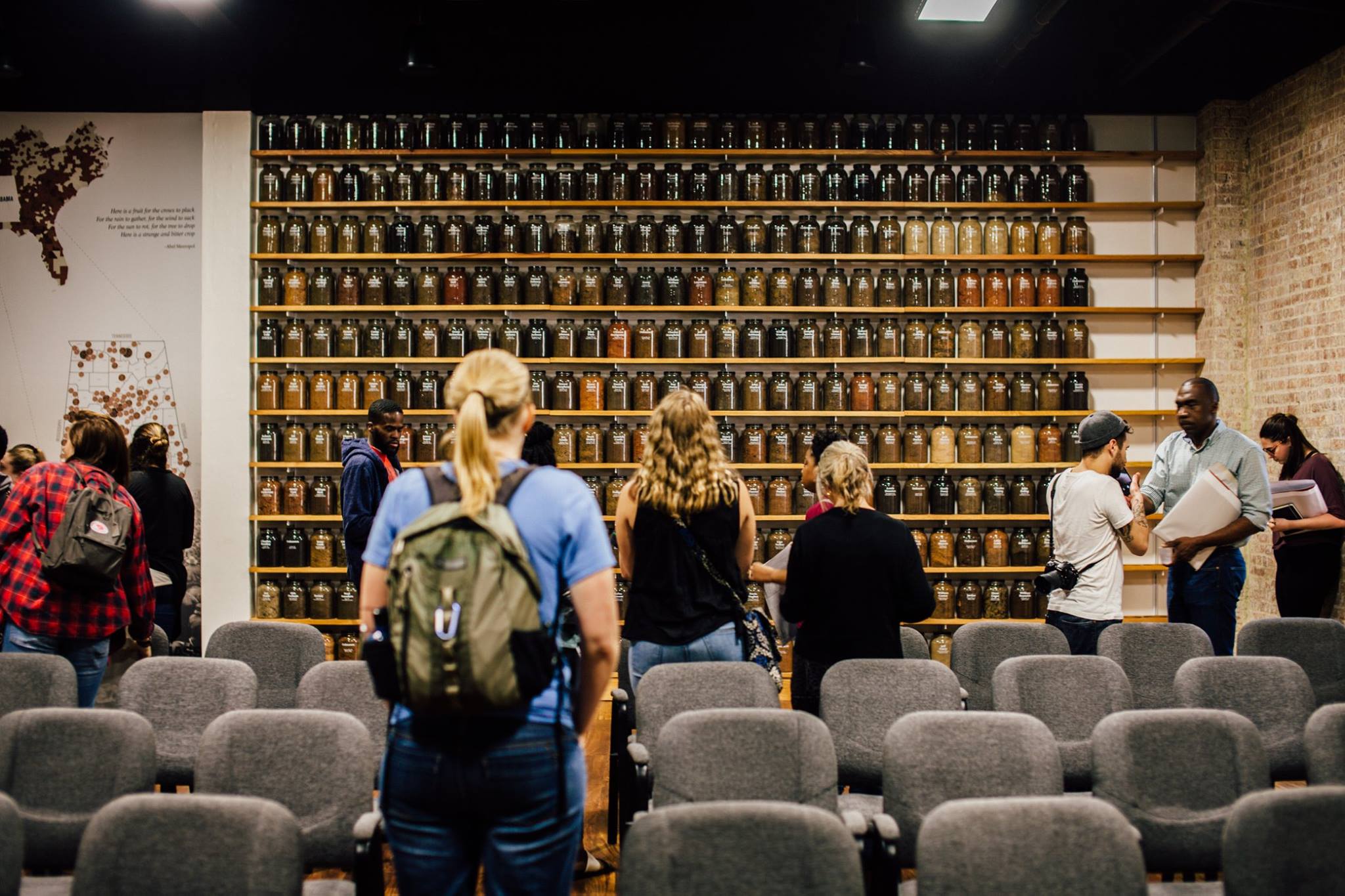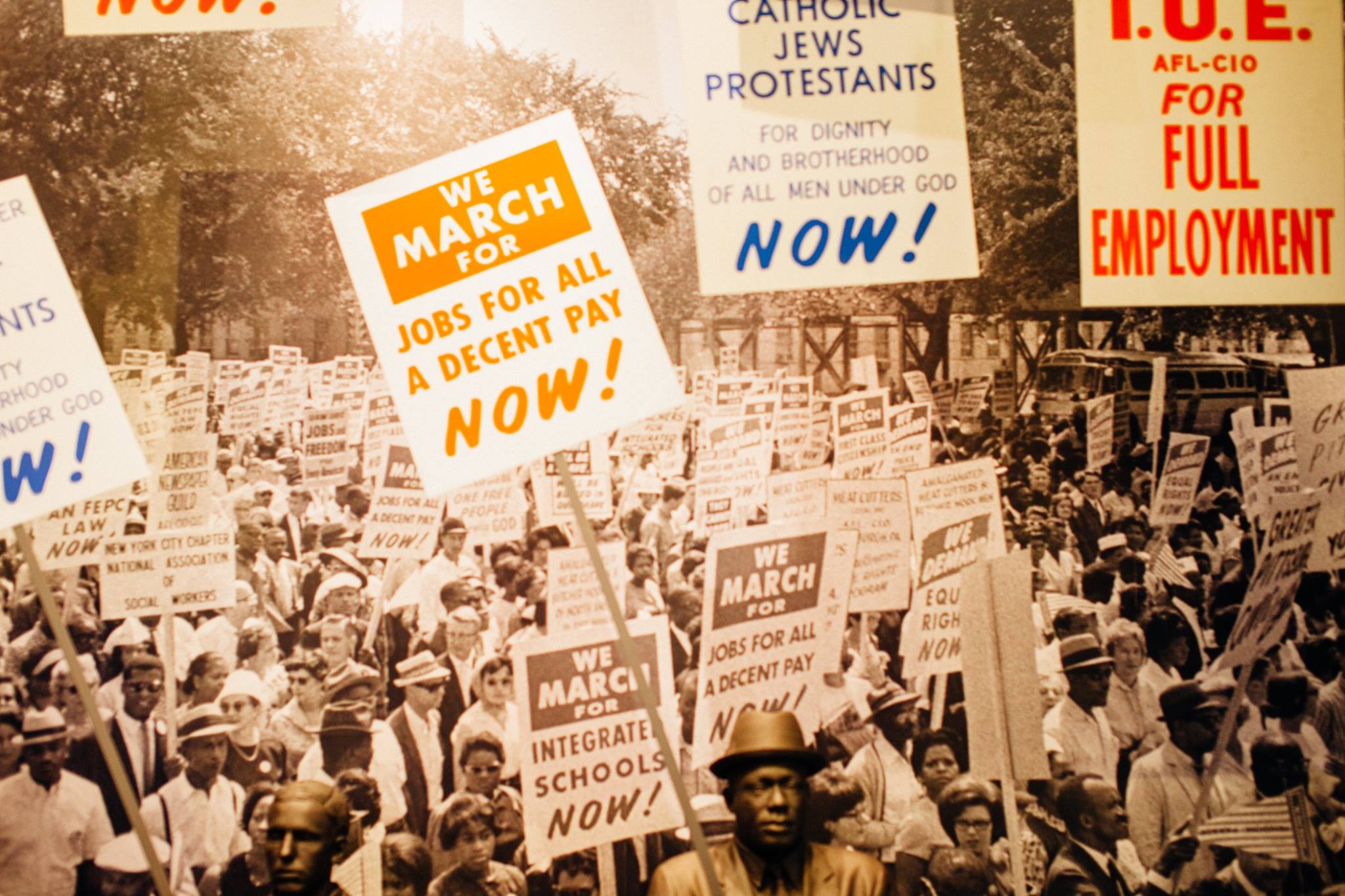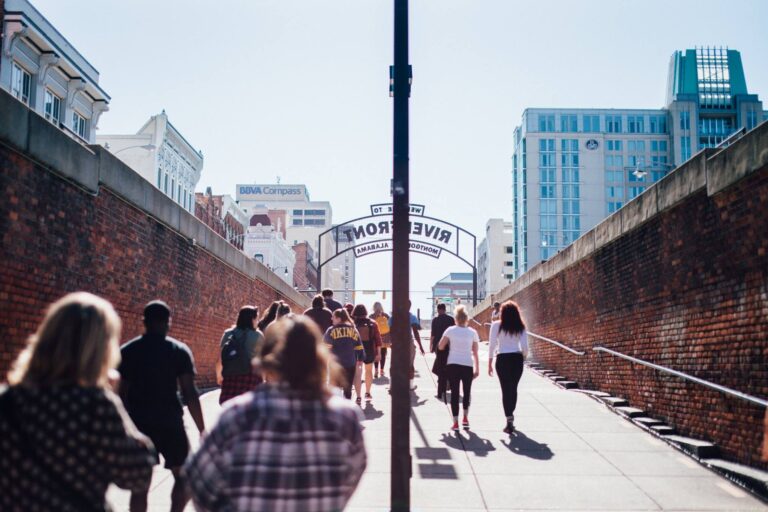
This is a student blog post submitted by Stephen Nielsen, C’19 and Charlotte Manning, C’17. Stephen is an English (creative writing concentration) and Media Studies double major. Charlotte Manning is an English major with a concentration in creative writing.
It’s been two months since Charlotte Manning and I traveled with 42 others on the University Ministries-led “Sankofa” trip. The bus ride from Chicago, Illinois to Montgomery, Alabama alone took 12 hours. Why were we subjecting ourselves to this? We can talk about the bathroom situation later, but suffice it to say, the men didn’t smell anything for days after the trip. Here, Charlotte and I share our thoughts about the experience.
Charlotte
The trip is designed with such intention. We were assigned with partners of different races and ages, so experiences were quite naturally formed. It is so much more than an educational field trip or a simple act of social justice; rather, the experience and purpose of Sankofa is about as complex as the word “race.” No matter how uncomfortable we may have felt amongst our peers, we could not escape the conversation of race. And trust me, I know that the mere thought of that makes people want to run for the nearest hills, and although that fearful feeling is valid, discomfort is the whole point.
I am a half-black, half-white, Swedish-American, and even I cringed at the thought of mourning my own history and race. My whole life I preferred to disconnect the past from my own personal experience as a middle-class, privileged, millennial woman of color, but Sankofa changed that. We all felt the heavy burden of ignorance in some way in those three days, but the beauty of our group’s dialogue came from those realizations.
The ability to choose to stay out of the race conversation is ignorance in its most murderous form.
As badly as we all wanted to get off that bus and vow to forever say that “we don’t see color,” because it would have been easier that way, we quickly learned that the ignorance we had always heard of and shrugged our shoulders to was in us. The way we all had chosen to ignore the painful part of the conversation, those times we did not speak up when we should have, the times we denied our privilege, and the times we swore we had a black friend who swore we weren’t racist. We’ve heard it all, we’ve done it all and yet, our lack of presence in the conversation has only been the water to the roots that have perpetuated racism and furthered the evolution of slavery and oppression, unending.
 Stephen
Stephen
We were unprepared. I was unprepared. I saw things I didn’t want to see; things I needed to see, and was treated in ways I’ll never be treated, but other humans have had to endure, and much worse. It’s been two months; why did it take so long to get this piece written? It wasn’t because other deadlines were pushed up, it was because we weren’t taught how to process everything. The number of conversations I’ve had about race have surged. I had nothing to say before, now I thought I had everything to say after this trip. I still have a lot to say, but there is so much I still don’t know. We were taught of systematized racism. “But systematized racism is illegal, why would it happen?” some have asked.
1 in 17 Whites in America will go to jail, while 1 in 3 Blacks in America will go to jail. Is this an example? “No, that’s just black culture,” some have said. “If you look at them, they’re fatherless, men get women pregnant and then leave them. It’s black culture, it’s not racism.” So, does this then still have to do with privilege? These numbers still don’t accurately represent the American population. There is something wrong, but is it in the Black or White community? Is it a result of oppression, or irresponsibility? But then isn’t that incorrectly stereotyping, to say that Black people aren’t responsible? We know that’s not true. If racism is only on the individual level, then that’s where we must tackle it. But it’s not, is it? Biased medias don’t portray lives correctly; they produce a fear of color.
The trip left me with more questions than answers. It opened my mind to massive amounts of information and ideas that have never occurred to me, being in America. I have noticed if, how, or where race has been playing a role in our country, and what roles race is playing. I was downtown the other day, and walked into four different clothing and accessory stores. Only one of those had about an equally mixed race staff during the two-hour time span I was there. The rest of the stores had primarily or only Black staff members. What does this mean?
Charlotte
We learned that privilege is being white. We learned that slavery hasn’t ended; rather it has evolved into what we now know as the criminal justice system. We learned that socioeconomic discrepancies are the way they are because of the blueprint that our forefathers used to build our cities—with intention to divide and segregate. We learned that tolerance is not the same thing as love and acceptance. We learned that even once we recognize the ignorance, the privilege, and our individual role in being an advocate for people of color, the conversation of race is never easy, and never gets easier. But that does not mean it has to be a conversation of hopelessness. Racism is not dead. We witnessed it in Selma, Alabama where the streets were once covered with Civil Rights protestors, we heard it in the preserved voices of Martin Luther King and Angela Davis who refused to be quiet, we felt it with the old slave shackles we wrapped around our ankles, and we felt it in the conviction and sympathy of God’s words, over ours, every time.
Stephen
“How was Sankofa?” I was asked just about a gazillion times after I got back. There were no words to describe my feelings; the hurt we all experienced, the sadness and empathy we all felt sitting in the Equal Justice Initiative, the laughs we shared on the bus or over a meal, and the silence after watching the documentary “13th”. I have only been able to talk about my experiences with those who were on the trip. Two months later, I still haven’t told my family everything about the trip, I don’t know how.
What can be done? We all know that going up to an intentionally racist person and telling them off probably won’t change their worldview or actions. Something you can do? Be aware of the types of people you surround yourself with. What are their backgrounds? In your workplace, who are the people who are or aren’t speaking up? Why? Who is over or underrepresented? Why? Can something be done? If you have the power to direct the conversation, or know you won’t be shot down for speaking up, use that to get the underrepresented voice out there.
 Charlotte
Charlotte
The ability to choose to stay out of the race conversation is ignorance in its most murderous form. And I encourage everyone with a beating heart, especially those with ivory skin, to try and do the same thing in the conversation of race. Whether or not you believe in the kingdom of God, compassion is a universal notion, one we all hope to receive at one point or another, but I believe that true compassion is a selfless act and an effective weapon against injustice.
Stephen
Regardless of your stance on racism, especially in America, we want to challenge you to listen to someone who isn’t like you, who doesn’t look like you, or come from a similar background as you. Go somewhere you wouldn’t normally go, hang out with someone you wouldn’t normally hang out with because of a preconception you might have of the place or them. It can’t hurt to hear another side. And find out the why in history. Ask: “Why. . . ? ”
Charlotte
Enter into it, feel the discomfort in others’ experiences, and open up your eyes to the possibility that human suffering does not have to directly affect you to move you.
Portions of this piece also appear in issue published May, 2017.
Read More:


